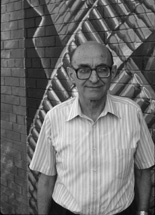SSA Centennial Celebration
Profiles of Distinction Series
Irving A. Spergel
George Herbert Jones Professor Emeritus
With his respected, groundbreaking work on youth gangs in the United States, his contributions to SSA programs, and his commitment to students, Professor Irving Spergel has been one of the School’s brightest shining stars for over 47 years.
Mr. Spergel earned his A.B. in Social Sciences in 1946 from City College of New York, an A.M. in Social Work in 1952 from the University of Illinois, and a Ph.D. in Social Work in 1960 from Columbia University. His interest in research on gangs developed while working with gang youths from 1952 to 1960, as part of the New York City Youth Board. The Board was one of the earliest organized responses to youth gangs. Through its street worker program, the organization worked to reduce gang tensions by building long-term relationships with members, and by providing constructive, alternative activities.
Over the span of his career, Mr. Spergel has written more than 100 books, articles, monographs, and other publications. Perhaps the best known among them are, Racketville, Slumtown, Haulburg: An Exploratory Study of Delinquent Subcultures, and 1995’s, The Youth Gang Problem: A Community Approach, which is a leading work in the field.
Most policy and programmatic responses to gang activity focus on either law enforcement or youth development. A major contribution of Mr. Spergel’s work, known as the “Spergel Model,” is its call for a coordinated approach that encompasses law enforcement, community groups, schools, social service agencies, and governmental organizations. This inclusive gang prevention, intervention, and suppression program is based on Mr. Spergel’s national assessment of youth gang policies and programs.
The U.S. Department of Justice has endorsed the Spergel Model, testing the program in more than 20 cities around the country over the last decade. The National Youth Gang Center uses the model as a central component in its work. A test of the model in Little Village Chicago, showed a 40 percent reduction in serious violence for the 200 program youths, compared to an equivalent sample of non-participating youths, from the same gangs over a five-year period.
Mr. Spergel has also left a vast and indelible imprint on SSA. Together with Mary Lou Somers and Paul Gitlin, he helped develop the School’s group work program. In addition, he recharged SSA’s community organizing program, connecting theory and practice through his own activism, and ongoing research in Chicago’s Woodlawn neighborhood.
Scores of SSA alumni fondly remember Mr. Spergel’s generosity as a teacher. “It staggers my mind to think of how many young lives that Irv Spergel has touched, making them better people, and the world a better place to live. He taught me about the meaning of ‘community,’ about different models of intervention, and about delinquency and poverty. Most of all, he taught me how to think about theoretical issues and to test them in actual community settings,” said David Protess, A.M. 1970, Ph.D. 1974, Charles Deering McCormick Professor of Journalism at Northwestern University, and Director and Founding Director, The Medill Innocence Project. Mr. Protess was one of the more than 35 doctoral students for whom Mr. Spergel participated in, or chaired their dissertation committees.
In 2006, SSA honored Mr. Spergel’s scholarship and contributions with a working festschrift conference entitled, “What Works: Addressing the Community Youth Gang Problem in the United States”. A festschrift is the commemoration of a respected academic’s work, organized by colleagues and former students and presented during his or her lifetime.
